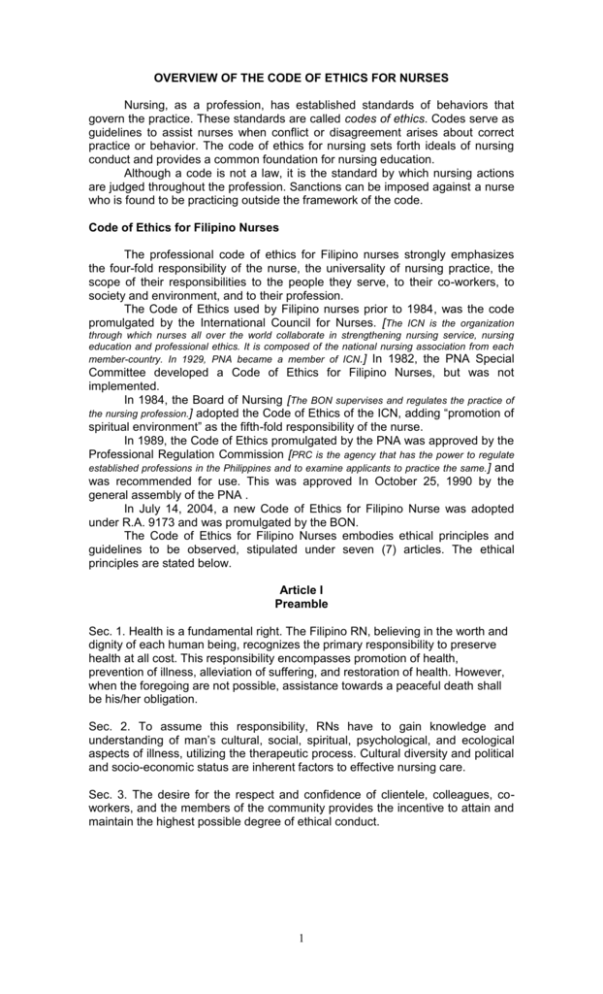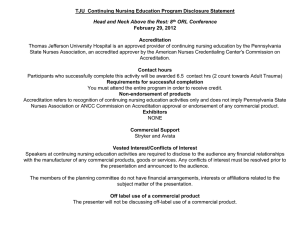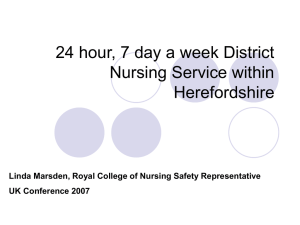Code of Ethics for Filipino Nurses
advertisement

OVERVIEW OF THE CODE OF ETHICS FOR NURSES Nursing, as a profession, has established standards of behaviors that govern the practice. These standards are called codes of ethics. Codes serve as guidelines to assist nurses when conflict or disagreement arises about correct practice or behavior. The code of ethics for nursing sets forth ideals of nursing conduct and provides a common foundation for nursing education. Although a code is not a law, it is the standard by which nursing actions are judged throughout the profession. Sanctions can be imposed against a nurse who is found to be practicing outside the framework of the code. Code of Ethics for Filipino Nurses The professional code of ethics for Filipino nurses strongly emphasizes the four-fold responsibility of the nurse, the universality of nursing practice, the scope of their responsibilities to the people they serve, to their co-workers, to society and environment, and to their profession. The Code of Ethics used by Filipino nurses prior to 1984, was the code promulgated by the International Council for Nurses. [The ICN is the organization through which nurses all over the world collaborate in strengthening nursing service, nursing education and professional ethics. It is composed of the national nursing association from each member-country. In 1929, PNA became a member of ICN.] In 1982, the PNA Special Committee developed a Code of Ethics for Filipino Nurses, but was not implemented. In 1984, the Board of Nursing [The BON supervises and regulates the practice of the nursing profession.] adopted the Code of Ethics of the ICN, adding “promotion of spiritual environment” as the fifth-fold responsibility of the nurse. In 1989, the Code of Ethics promulgated by the PNA was approved by the Professional Regulation Commission [PRC is the agency that has the power to regulate established professions in the Philippines and to examine applicants to practice the same. ] and was recommended for use. This was approved In October 25, 1990 by the general assembly of the PNA . In July 14, 2004, a new Code of Ethics for Filipino Nurse was adopted under R.A. 9173 and was promulgated by the BON. The Code of Ethics for Filipino Nurses embodies ethical principles and guidelines to be observed, stipulated under seven (7) articles. The ethical principles are stated below. Article I Preamble Sec. 1. Health is a fundamental right. The Filipino RN, believing in the worth and dignity of each human being, recognizes the primary responsibility to preserve health at all cost. This responsibility encompasses promotion of health, prevention of illness, alleviation of suffering, and restoration of health. However, when the foregoing are not possible, assistance towards a peaceful death shall be his/her obligation. Sec. 2. To assume this responsibility, RNs have to gain knowledge and understanding of man’s cultural, social, spiritual, psychological, and ecological aspects of illness, utilizing the therapeutic process. Cultural diversity and political and socio-economic status are inherent factors to effective nursing care. Sec. 3. The desire for the respect and confidence of clientele, colleagues, coworkers, and the members of the community provides the incentive to attain and maintain the highest possible degree of ethical conduct. 1 Article II Registered nurses and people Sec. 4. Ethical Principles 1. Values, customs, and spiritual beliefs held by individual shall be respected. 2. Individual freedom to make rational and unconstrained decisions shall be respected. 3. Personal information acquired in the process of giving nursing care shall be held in strict confidence. Sec. 5. Guidelines to be observed Registered nurses must a. consider the individuality and totality of patients when they administer care; b. respect the spiritual beliefs and practices of patients regarding diet and treatment; c. uphold the rights of individuals; and d. take into consideration the culture and values of patients in providing nursing care. However, in the event of conflicts, their welfare and safety must take precedence. Article III Registered Nurses and Practice Sec. 6. Ethical Principles 1. Human life is inviolable. 2. Quality and excellence in the care of patients are the goals of nursing practice. 3. Accurate documentation of actions and outcomes of delivered care is the hallmark of nursing accountability. Sec. 7. Guidelines to be observed Registered nurses must a. know the definition and scope of nursing practice which are in the provisions of R. A. No. 9173, known as the “Philippine Nursing Act of 2002” and Board Res. No. 425, Series of 2003, the “Rules and Regulations Implementing the Philippine Nursing Act of 2002,” (the IRR); b. be aware of their duties and responsibilities in the practice of their profession as defined in the “Philippine Nursing Act of 2002” and the IRR; c. acquire and develop the necessary competence in knowledge, skills, and attitudes to effectively render appropriate nursing services through varied learning situations; d. if they are administrators, be responsible in providing favorable environment for the growth and development of Registered Nurses in their charge; e. be cognizant that professional programs for specialty certification by the BON are accredited through the Nursing Specialty Certification Council (NSCC); f. see to it that quality nursing care and practice meet the optimum standards of safe nursing practice; g. insure that modification of practice shall consider the principles of safe nursing practice; 2 h. if in position of authority in a work environment, be normally and legally responsible for devising a system of minimizing occurrences of ineffective and unlawful nursing practice; and i. ensure that patient’s records shall be available only if they are to be issued to those who are professionally and directly involved in their care and when they are required by law. Sec. 8. Ethical Principle 4. Registered Nurses are the advocates of the patients: they shall take appropriate steps to safeguard their rights and privileges. Sec. 9. Guidelines to be observed Registered Nurses must a. respect the “Patients’ Bill of Rights” in the delivery of nursing care; b. provide the patients of their families with all pertinent information except those which may be deemed harmful to their well-being; and c. uphold the patients’ rights when conflict arises regarding management of their care. Sec. 10. Ethical Principle 5. Registered Nurses are aware that their actions have professional, ethical, moral and legal dimensions. They strive to perform their work in the best interest of all concerned. Sec. 11. Guidelines to be observed Registered Nurses must a. perform their professional duties in conformity with existing laws, rules, regulations, measures, and generally-accepted principle of moral conduct and proper decorum; b. not allow themselves to be used in advertisement that should demean the image of the profession (i.e. indecent exposure, violation of dress code, seductive behavior, etc.) c. decline any gift, favor or hospitality which might be interpreted as capitalizing on patients; d. not demand and receive any commission, fee or emolument for recommending or referring a patient to physician, a co-nurse or another health worker; not to pay any commission, fee or other compensation to the one referring or recommending a patient to them for nursing care; e. avoid any abuse of the privileged relationship which exists with patients and of the privileged access allowed to their property, residence or workplace. Article IV Registered Nurses and Co-workers Sec. 12. Ethical principles 1. The Registered Nurse is in solidarity with other members of the health care team in working for the patient’s best interest. 2. The Registered Nurse maintains collegial and collaborative working relationship with colleagues and other health care providers. Sec. 13. Guidelines to be observed 3 Registered Nurses must a. maintain their professional role/identity while working with other members of the health team; b. conform with group activities as those of a health team should be based in in acceptable, ethico-legal standards; c. contribute to the professional growth and development of other members of the health team; d. actively participate in professional organizations; e. not act in any manner prejudicial to other professions; f. honor and safeguard the reputation and dignity of the members of nursing and other professions; refrain from making unfair and unwarranted comments or criticisms on their competence, conduct, and procedures; or not do anything that will bring discredit to a colleague and to any member of other professions; and g. respect the rights of their co-workers. Article V Registered Nurses, Society, and Environment Sec. 14. Ethical Principles 1. The preservation of life, respect for human rights, and promotion of healthy environment shall be a commitment of a RN. 2. The establishment of linkages with the public in promoting local, national, and international efforts to meet health and social needs of the people as a contributing member of society is a noble concern of a RN. Sec. 15. Guidelines to be observed Registered Nurses must a. be conscious of their obligations as citizens and, as such be involved in community concerns; b. be equipped with knowledge of health resources within the community, and take active roles ion primary health care; c. actively participate in programs, projects, and activities that respond to the problems of society; d. lead their lives in conformity with the principles of right conduct and proper decorum; and e. project an image that will uplift the nursing profession. Article VI Registered Nurses and the Profession Sec. 16. Ethical Principles 1. Maintenance of loyalty to the nursing profession and preservation of its integrity are ideal. 2. Compliance with the by-laws of the accredited professional organization (PNA) and other professional organizations of which the RN is a member is a lofty duty. 3. Commitment to continual learning and active participation in the development and growth of the profession are commendable obligations. 4. Contribution to the improvement of the socio-economic conditions and general welfare of nurses through appropriate legislation is a practice and visionary mission. 4 Sec. 17. Guidelines to be observed Registered Nurses must a. be members of the accredited professional organization which is the PNA; b. strictly adhere to the nursing standards; c. participate actively in the growth and development of the nursing profession; d. strive to secure equitable socio-economic and work conditions in nursing through appropriate legislation and other means; and e. assert the implementation of labor and work standards. Article VII Administrative Penalties, Repealing Clause and Effectivity Sec. 18. ` The certificate of registration of the RN shall either be revoked or suspended for violation of any provisions of this Code pursuant to Sec. 23 (f), Art.IV of R.A. No. 9173 and Sec. 23 (f), rule III of Board Res. No. 425, Series of 2003, the IRR. * *Art. IV of R.A. 9173 – Examination and Registration Sec. 23. Revocation and Suspension of Certificate of Registration/Professional License and Cancellation of Special/Temporary Permit. – The Board shall have the power to revoke or suspend the certificate of registration/professional license or cancel the special/temporary permit of a nurse upon any of the following grounds: (a) For any of the causes mentioned in the preceding section; (b) For unprofessional and unethical conduct; (c) For gross incompetence or serious ignorance; (d) For malpractice or negligence in the practice of nursing; (e) For the use of fraud, deceit, or false statements in obtaining a certificate of registration/professional license or a temporary/special permit; (f) For violation of this Act, then rules and regulations, Code of Ethics for nurses and technical standards for nursing practice, policies of the Board and the Commission, or the conditions and limitations for the issuance of the temporary/special permit; or (g) For practicing his/her profession during his/her suspension from such practice; Provided, however, That the suspension of the certificate of registration/professional license shall be for a period not to exceed four (4) years. ** Rule III of Board Res. No. 425, Series of 2003, the IRR (Implementing Rules and Regulations o Same as rule III of Board Res. No. 425, Series of 2003, the IRR except: (f) For violation of RA No. 9173 and this IRR, Code of Ethics for nurses and Code of Technical Standards for nursing practice, policies of the Board and the Commission, or the conditions and limitations for the issuance of the special/temporary permit; or For this purpose, the suspension of the Certificate of Registration/Professional License shall be for a period not to exceed four (4) years. 5






